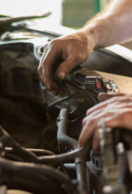It's summer, and it might feel like a broken air conditioning system is the worst thing that could happen to your car in the sweltering heat. So when your AC has had enough and quits, what do you do? Is it always a pricey fix? Is it ever something you can diagnose or fix on your own, if you're handy?
Diagnosing AC Issues
There are a few different things that could cause your car's AC to stop working. While the most common cause is a leak, that's not the only potential cause. Here are a few:
- Leaking refrigerant due to a broken o-ring, seal, or hose
- Clogging in the expansion tube or refrigerant charging hose
- Problems in the compressor and/or the compressor clutch
- Problems with the blower motor and/or the blower motor resistor
- Problems in the condenser and/or evaporator
- Leaks in the vacuum system
- Other parts problems, including issues with the switch, fuse, relay, solenoid, or control module
 Leaks in the AC system can be tricky to detect. Mechanics often use a black light to find the leaks (most refrigerant contains dye that allows it to be detected under a black light, for this very purpose). Another alternative is a "sniffer" device which can detect the chemicals in the refrigerant to hone in on the leaky area.
Leaks in the AC system can be tricky to detect. Mechanics often use a black light to find the leaks (most refrigerant contains dye that allows it to be detected under a black light, for this very purpose). Another alternative is a "sniffer" device which can detect the chemicals in the refrigerant to hone in on the leaky area.
If the AC works, but only weakly, the problems may be caused by mold or mildew buildup within the evaporator core, a loose blower hose, a broken ventilation fan, or compromised seals. If the closed system becomes even slightly open to outside air, the whole thing can slowly (or quickly) go kaput. If you start to notice these warning signs of reduced airflow or warmer-than-usual airflow, be sure to get your vehicle diagnosed right away so that the problem can be fixed in its early stages, rather than allowing it to progress to a bigger and more expensive repair.
Fixing the Problem
How the problem will be fixed depends, of course, on the cause. As parts age and leaks begin to occur, refrigerant is allowed out and moisture is allowed in. If moisture gets into the system, it can spell the end for your car's AC. This is because moisture mixes with refrigerant to create a corrosive acid, which can destroy the inner workings of the whole system.
Preventing the Problem
In general, getting your AC's issues diagnosed by a certified mechanic will ensure that you find and address the problem, as well as preventing further damage. If you start to notice any symptoms of a problem, it's a good idea to take it in right away. It's an even better idea to have your system checked regularly to check for problems before they are even noticeable, perhaps at the beginning of every summer.
Keep yourself and your family cool, and don't break the bank by letting damage progress until it's an expensive fix. Take your vehicle to All in the Wrist Auto and Diesel Repair right away to take care of all your repair or maintenance needs.








